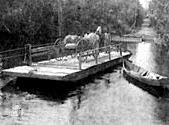9 January 1819
Tugaloo
I was not able to write yesterday as we
stopped when it was nearly dark. By the time we ate our supper and prepared for
our night's rest, it was far too dark to write.
The past two days have been instructive. We had our first encounter with
the natives at the ferry across the upper Savannah river
near Tugaloo.
Being in the middle of our caravan, I
was not a witness to the negotiations that went on between my uncle and the
natives. I am not certain if they were Creek or Cherokee. But I do know that it
held up our group for about an hour while they negotiated the terms of the
ferry crossing. It would take several trips across the river for all of us to
reach the other side. I suppose that, there being no alternative, we had to pay
whatever price they charged us. But Uncle John is a fierce negotiator, and we
were eventually on our way.
I suppose that I need not have feared
anything from these natives. They seemed harmless enough, although they were,
as it turned out, good businessmen. I
saw a few of the women who were minding a fire, but got no glimpse of any
dwelling place. I assume that any such
place is deeper within the forest.
The river itself was beautiful. There
were oak, mulberry, and walnut trees near the banks, and grasses sprang up in
between. The winter sun reflected off
the water, giving it a warm golden hue. The river eventually wends its way to
the ocean at Savannah
We shall have to make haste to reach
the town of Athens Fort
Hawkins Federal Road
For now, we are encamped somewhere
between the Savannah River and Athens
Night falls so early in these winter
months, and without our more civilized surroundings, we are confined quite
early to our wagons. Beds have been made for us atop the provisions, and some
thought had been given to see after our comfort. Still, I miss the bed I knew all my
life.
Father and Uncle continue to sleep
outside, and I am not certain where Susie sleeps as she is up after I fall
asleep and before I awaken. I know that it should not be my concern, but I
suppose that Susie is with the other Negroes at night. Being a house servant,
she is not used to being around the field hands, so I wonder how she is
managing. That is to say, specifically,
I wonder if she is with Father instead.
But that is not my concern. I do not
care.

